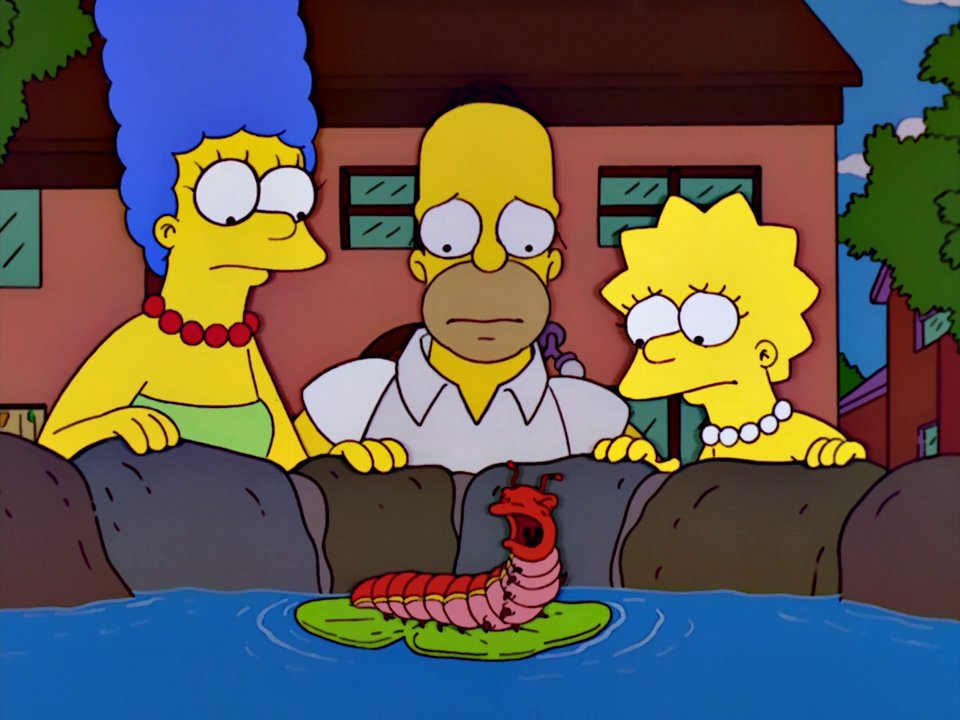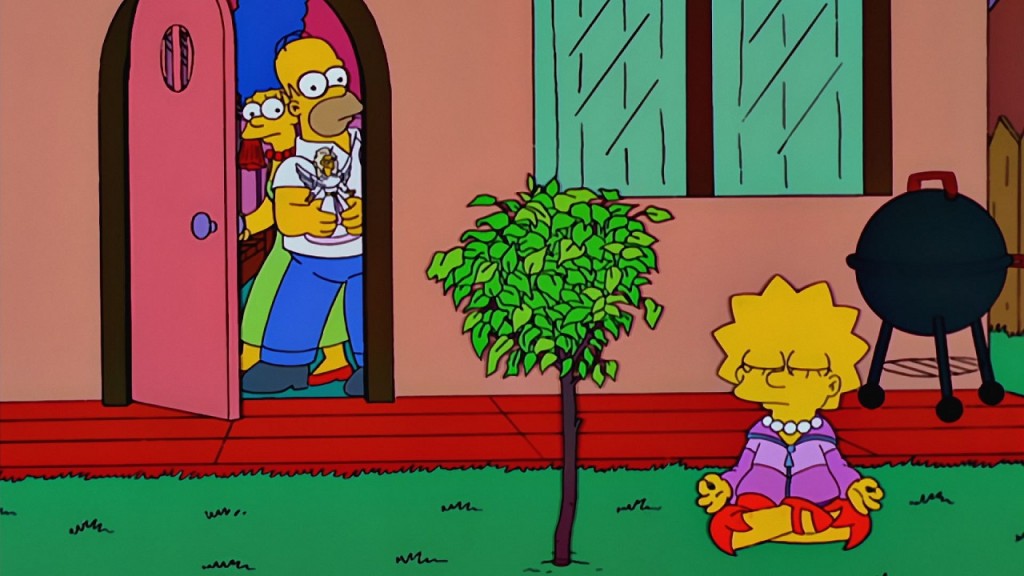-
Recent Posts
- Better Call Saul: There Are No Happy Endings between a “Rock and Hard Place”
- Black Widow Keeps It in the Family for Natasha’s Last Ride
- Loki Finds New Purpose in the Man behind the Mischief
- In its Debut, Star Wars: The Bad Batch Decides Whether to Obey or Rebel
- Nomadland: A Film Out of Time, For Our Times
Archives
Recent Comments
- Ed Clarke on Contact
- Matt on Why “The Frying Game” Is a Dark Horse Contender for The Simpsons’s Worst Episode Ever
- Lilly Dow on Contact
- Stacey on Veep’s Series Finale and the Hollowness of Getting What You Want
- Evan Jaocbs on Contact
Meta
Tag Archives: The Simpsons Season 13
Why “The Frying Game” Is a Dark Horse Contender for The Simpsons’s Worst Episode Ever

Spare me your jockey elves. Forget your spring break alligators. Cast aside your amorous pandas and bar rags and even your Gagas. My poor lost souls, I beseech you to look upon thy screamapillar and weep — weep for us all.
Because “The Frying Game” may very well be The Simpsons’s worst episode ever.
As I discussed on The Simpsons Show podcast, I don’t make that pronouncement lightly. It’s hard to call “The Frying Game” overrated exactly — forgotten is probably more accurate — but it’s rarely brought up in discussions of the series’s nadir. And yet it deserves to be ground into the dirt like the fetid excuse for televised refuse that it is. What the episode lacks in the casual cruelty of other contemporary Simpsons outings, or the aimless racism of the show’s more regrettable international jaunts, it makes up for in being emblematic of everything wrong with the series at this point in its run. It is a nonsensical, irritating, embarrassing blight upon the face of what was once the greatest show on television.
The Simpsons Is Born Again in “She of Little Faith”
Season 13 was a time of transition for The Simpsons. The show would burn off the last handful of episodes overseen by superfan punching bag, Mike Scully. Al Jean (who’d supervised seasons 3 and 4 with writing partner Mike Reiss) would return to take the reins after almost a decade away. And the show gradually shifted from its manic decline to its comfortable persistence. The result, as I’ve discussed before, was a season of television that called back to the classic era Jean had been a part of, that still found itself subject to some of the worst habits of the Scully administration, and that previewed the steady anodyne march of years that would possess the show for the next [gulp] two decades.
But as I discussed on The Simpsons Show Podcast, the opening episode of Jean’s second tour of duty, “She of Little Faith”, gave fans a glimmer of hope. Make no mistake, the episode still has some of the telltale signs of the prior regime’s failings. The pacing is a little nuts. There are some overly cartoony gags. And at times, there is still the undercurrent of meanness that hurried along the show’s fall from grace.
The Simpsons and the Division of Al Jean: “Little Girl in the Big Ten” (S13E20)
It’s fairly easy to divide up the first twelve years of the The Simpsons, into different eras based on who served as the showrunner for each season. Matt Groening, James L. Brooks, and Sam Simon established the show in its first two seasons. Al Jean and Mike Reiss took the series to new heights in Seasons 3 and 4. David Mirkin brought a more joke-heavy style in Seasons 5 and 6. Bill Oakley and Josh Weinstein ran the show with a more experimental bent in its seventh and eighth seasons. And finally, Mike Scully presided over the series’ creative decline in Seasons 9-12. Each period within this time frame has its own style and sensibility that can be traced back to the individuals in charge.
After that, however, things get tricky. Al Jean returned as showrunner for Season 13, and instead of the usual two-to-three year tour of duty on the job, he has proceeded to hang onto that title for over twelve years, producing more than 250 episodes in that time.
That’s nearly half of the show’s run, and it’s much more difficult to chop up those seasons up into discrete eras. Some of the show’s most ardent fans have thrown around terms like “Early Jean,” “Late Jean,” and “the HD era.” Some have tried to use The Simpsons Movie as a dividing line during Jean’s tenure. But it’s much harder to classify the gradual, sometimes rocky, evolution of the show under a single individual than it is to note the sharp changes in direction that came when different showrunners each brought their distinct visions for the series to the table.


